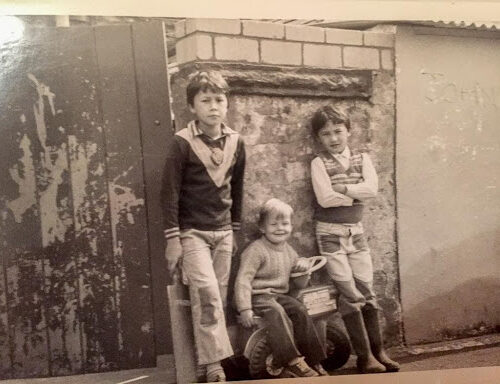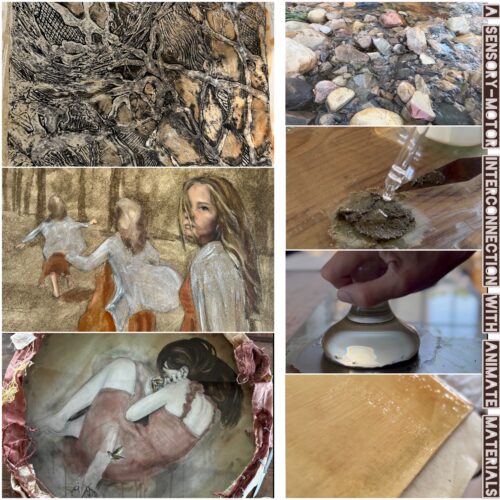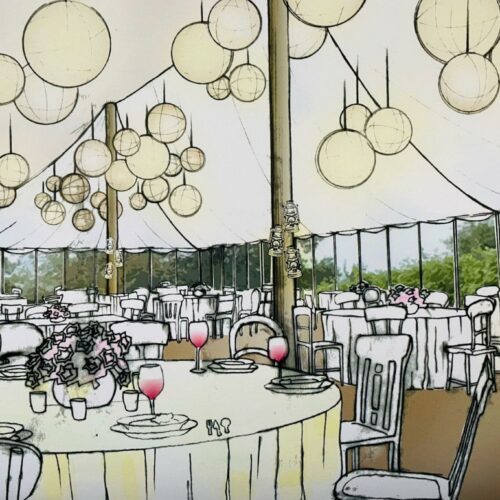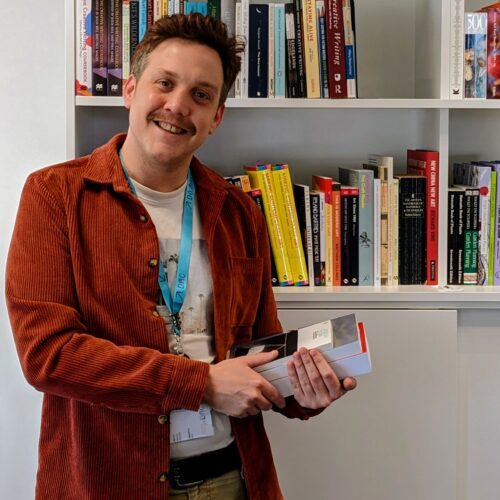
Motivated to work in Equality and Diversity
The motivations for my becoming the OCA student representative for Equality and Diversity are deeply embedded in my personal experiences of racial and social class based injustices. I felt that this personal context was important to illustrate my interest and commitment to the role. But equally I wanted to add a real life dimension to the discussion on equality and diversity. ‘Whiteness’, ‘the male gaze’, decolonisation, marginalisation, ‘silencing’, ‘the self and other’, accessibility; these terms can become quite abstract when discussed purely on a theoretical level; we should remember that this is always about people’s lives.

My dad, Frank, was in the British colony Hong Kong with the British Army when he met my mother, Yuet Wah. They married (image above) in Hong Kong, coming to England in 1955, to dad’s home in Padiham, a small mill community on the outskirts of Burnley, Lancashire.
They had four children, Carol, Michael, myself Allan and Kieran. Only Carol has a Chinese name Tse, her middle name. My mum was worried that “the boys would get trouble if they have Chinese names”. We had no Chinese friends or extended family, my mum had been adopted and so she was only really close to the girl she was brought up with whom she called her cousin. My mum came to England literally to start a new life.

We were brought up in the northern English working class way. (image above, I’m on the left, my brother Kieran right, little John our neighbour, centre). Except in our house there was the Chinese English dictionary, jade, the buddha ornaments, blue enveloped airmail letters postmarked from Hong Kong, the mah-jong set, the giant cleaver, chopsticks in with the knives and forks. These were mum’s everyday things from Hong Kong, but to me they were secret nuggets of gold from a mythical land which within our house felt totally normal.
My first living memory of being seen as ‘different’ happened when I was probably 5 or 6 years old, maybe even younger. An older boy asked me if I was from Korea. I can still feel that strange feeling – perhaps triggered when I saw another boy verbally restrain him from going any further that I recognised that I had escaped something which I had never ever encountered before.
Britain in the 70s and 80s could be cruelly racist, and as a teenager, part of me would always die inside if a conversation seemed to drift towards subjects like the TV show Kung Fu, a takeaway order of Sweet and Sour, a pop song called titled Turning Japanese.
I have experienced direct racist abuse, more times than I ever admitted – not least of all to myself. I often said, ‘not as often as others’, but as my brother once said, it only needs to happen once, especially when you’re a child – I never doubted myself but there is something uniquely painful about racist abuse or discrimination that is truly and deeply demoralising. I’ve also experienced plenty of class based barriers and discrimination but somehow it just never felt as personal, not to me anyhow.
As my ‘English self’, I went through University, corporate career and entrepreneurial stages, my Hong Kong roots were compartmentalised and I became insensitive to them. It was my mother that was from Hong Kong, it had nothing to do with me.
Looking back now, I can see that I was protecting myself by whitewashing my ‘difference’, over-compensating with drive and ambition, pursuing the universal middle-class lifestyle. Casual racism never goes away, not for the Chinese anyhow, but I was able to joke about my background whilst foregrounding my northern roots, in many ways portraying the good immigrant, being ‘successful’ became important to my defence mechanisms.
My view on life became very pragmatic, simplistic even; that ‘everybody is something’ and you just have to get on with it and make things happen.
But then I began to question where I was going. I tried a few different things, bought a camera and in 2014 I signed up with OCA. It took me a couple of years to settle into the whole ‘creative thing’ but then I began to seriously challenge everything that had happened in my life and the social structures that exist around us.
In the first half of 2017 my dad died and my partner survived a life threatening stroke, I hit a brick wall and went through counselling. In the emotional and psychological untangling almost inevitably I progressed to questioning my own identity, who I was, and how I wanted to live my life. It was then that I realised just how complex my inner psyche had become and just how far I had strayed from my real conscious self. ‘I’ was buried deep somewhere else and by concealing or repressing my Chinese heritage I had progressively neglected a large and very real part of myself.
I have since reflected that I have been different and in the minority throughout my life; a mixed race child, a working-class boy at Grammar school, first in the family to University, moving south from the north, challenging and outspoken in organisations. My dad was a reformed alcoholic, he stopped drinking when I was 4, he withdrew from his friends and therefore to an extent his community to refocus on his family.
I know how it feels to be different, under-estimated, misunderstood, ignored, singled out, to be alone. I never really felt confused about being mixed race, but I could not bear it to be painful; it was always about how I was being ‘seen’ and what the implications of that were.
I feel real pride in my Hong Kong Chinese heritage and I have found liberation and harmony in ‘my difference’. It allows an independence which has been invaluable in my being able to think, say and do what I really want to. I don’t have to do or say things to fit in, partly because I never do – fit in, and there are some very real benefits in this.
I know that in describing my own lived experiences that I don’t speak for everybody, and I’m also aware that there are ‘types of’, ‘degrees of’ and ‘levels of’ in everything: discrimination, deprivation, privilege and good fortune. Some people suffer more than others and everything is not purely racial or class based, there are many additional forms of discrimination – gender, sexual orientation, disabilities, and for many people who are affected by more than one single form of discrimination, including myself, they intersect. I now experience certain privileges that I share with others irrespective of ethnicity, in the same way that growing up on free school meals, I experienced many disadvantages that I shared with my white working class friends.
But through my personal experiences I have become fully aware of the fundamental problem of structural ‘barriers’, and that they are higher for some and lower or non-existent for others. And I have a general sense of what is required to reduce and remove barriers and what is required for change to happen. Change is not easy, we as humans seek out familiarity, continuity, order and structure in our lives.
As a mixed race individual you grow up and exist in 2 different spheres of influence (according to certain diaspora theories it’s actually 3) and so seeing different sides to an argument or story becomes a natural skill. But nobody is born with all the theoretical knowledge around subjects such as inequality and diversity, and I continue to develop my own learning and knowledge.
In my personal and professional life I have clearly seen the benefits that diversity brings; how diversity can bring healthy challenge, openness, balance, empathy and fairness to all situations from the most simple conversations to complex social systems.
I have already gained a strong feeling for the commitment to equality and diversity from the OCA and my commitment to OCA students is to drive for this to happen so that everyone has an equal chance to participate, to contribute and to thrive.
|
|







A very thoughtful and thought provoking statement. I enjoyed reading it as it made me wonder why humans are so reactive to difference, and why we construct narratives about what is acceptable thus creating those that are ‘in’ and those that are ‘out’.
I spent a lot of my working life trying to find adoptive families for children, many of whose parents came from different groups from around the world. It is difficult to find language to describe these situations without invoking some cultural ‘norm’. Many I spoke with indeed saw themselves in 3 universes, and one described to me how he never knew from one moment to the next , where he was inhabiting.
I wish you success in standing up for equality and diversity – they are fundamental for everyone.
I’ve been lucky to hear some of Allan’s story first hand and it’s great that others can read about it and learn from the experience. It shows the power of art not just to challenge received perspectives but our own ways of thinking. Nicely written Allan!
Thanks for sharing and standing up for what you are, Allan. I think one doesn’t need to be ‘visually different’ to experience humiliation and discrimination. I believe that humans as all living creatures seek comfort in what is shared. And what is different need to be recognized first before being included. Saying that means that behavior is often group directed, not individually addressed. Examples are plenty our there , social media and chat groups could be seen as just one example of that ‘echo chamber’ protectiveness.
I went through various kind of such experiences (living is various cultures and sub-cultures) and learned how to adapt. Adaptation is a core trait in all creatures as it helps to survive. What I learned, and you added few notes on that, is how this might lead towards over-adaptation, and when it gets dangerous for one self.
Jokes are for me another example for potential harassment and humiliation. Because they are understood only by a group with shared beliefs, excluding others. I often don’t get jokes at all, all language based, and my life is grounded in multiple languages and cultures, but without knowing one deeply (besides that I take some rather literally). Bottomline, one (as me) is either excluded and repelled or fights back.
Hope equality and diversity can be seen much wider than by surface visibilities. What is behind the surface hurts often more (just talking from my view, others might see it differently, of course).
Allan, thank you for sharing with us that deeply personal and very moving reflection on your motivations for becoming our equality and diversity rep. I am immensely proud to have you working alongside us to improve our commitment through understanding the ‘lived experiences’ and therefore taking action which makes a marked improvement for students rather than simply creating a policy without actionable improvement. We have much work to do – we are very far from perfect at OCA but I believe very strongly we can make giant steps forward on this together and also challenge our own systems and assumptions if they are not acting to enable inclusion and promote diversity of opinion and experience.
Thank you for such an inspirational reflection on your reasons for taking on this role Alan. I’m sure you’ll be a real asset to the Student Association
Good luck, Allan. I am sure you will make an excellent representative, bringing all your varied experiences and successes to the role. SJ
Thanks for sharing this brave and remarkably honest introduction Allan, I’m sure that as student rep for equality & diversity you’ll play a significant part in helping us to understand our colonial past and confront our racist present. I wish you all the best in the role.
Thanks for sharing. My mum was German and married my English father just after the war. She came out England with him and faced huge amounts of discrimination. She hid her German-ness, I wasn’t allowed to learn German. So am very aware of some of the issues.
beautifully written and moving piece
Zoe
Very moving and inspirational, the never-ending process of self-discovery which has been probably triggered by questions: what part of me is aching? why is all this so painful? Thank you, it raises many thoughts!
Thank you for sharing your well-penned experiences of exclusion and otherness Allan. It was personal, frank, moving and inspirational. I think, given your personal experiences, matters of equality and diversity are well placed in your hands.
Thumbs up for taking on the extra work,
Sonia